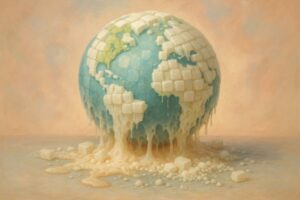There are truths so profound, so urgent, that they whisper through the rustling leaves, echo in the melting glaciers, and cry out in the parched soil beneath our feet. One such truth stares us in the face today: our climate is changing drastically, undeniably, and, in many ways, irreversibly. This isn’t merely about weather patterns or rising sea levels; it’s about the fragile, intricate relationship we share with our planet, a relationship built over epochs through systems finely tuned to sustain life.
Yet, here we stand at a curious crossroads of consciousness and consequence.
Humanity is often heralded as the apex of sentient life, capable of not just surviving but shaping its world. But in the pursuit of shaping, have we forgotten the shape we were meant to preserve? Philosophers have long asked: What makes us truly human? Is it our intellect, our innovation, or our introspection? Perhaps it is the latter that now beckons us most urgently.
When we ponder life on Earth, it is easy to center ourselves in the narrative. We are the protagonists of our own stories, the architects of civilisations, the authors of history. But this story began long before us. Life has thrived on this spinning blue ball for billions of years, mystical, complex, and ever-evolving. Forests grew, oceans breathed, and species adapted long before the first human footprint graced the soil. In this grand timeline, we are recent arrivals. And yet, our impact has been seismic.
A Legacy Etched in Smoke and Steel
From the dawn of the Industrial Revolution to the digital age, we have built cities that scrape the skies and machines that stretch the bounds of possibility. But these triumphs have not come without a cost. Toxic chemicals seep into rivers, once-thriving landscapes are left barren, and the lungs of our planet, its forests, are felled to feed our hunger for more.
Every skyscraper, every factory, every product on a shelf is a testament not just to human ingenuity, but also to our capacity for neglect. We are both the creators and the culprits, the dreamers and the destroyers.
And yet, when the conversation turns to accountability, we falter. We point fingers at governments, corporations, other countries, and previous generations. Rarely do we pause to look inward. Rarely do we accept that we are all stakeholders in this unfolding ecological drama. Every choice, every convenience, every moment of apathy is a vote cast in favour of or against the planet’s future.
Progress at a Price?
This brings us to the most pressing philosophical question of our time: Is evolution, be it technological, societal, or economic, doomed to come at the environment’s expense?
Must the march of progress trample over the Earth’s delicate systems? Can development and sustainability walk hand in hand, or are they forever at odds?
The answer lies not in grand declarations, but in a shift of perspective.
What if progress was not defined by how much we extract but by how wisely we regenerate? What if success was not measured in profits alone but in the preservation of forests, the revival of rivers, and the resilience of our communities? What if we began to see the planet not as a resource to be consumed, but as a living, breathing partner in our shared existence?
This is not to suggest that innovation must cease. On the contrary, the world needs more thinkers, more engineers, and more dreamers. But it needs them to create in harmony with nature, not in defiance of it.
The Time to Choose is Now
We are not the first species to alter its’ environment, but we may well be the first to do so knowingly and with such devastating effect. That knowledge is both a burden and a gift. It grants us the power to course-correct, to reimagine a civilization that flourishes without scorching the ground it walks upon.
The climate crisis is not merely an environmental issue; it is a civilisational reckoning. It asks us to redefine what it means to live well, to grow wisely, and to succeed responsibly.
So, let us not be remembered as the species that could comprehend existence, yet failed to honour it. Let us instead rise to the challenge of this age, not with despair, but with determination. Let us evolve, not away from nature, but back into alignment with it.
Because the future isn’t just something that happens to us. It’s something we create, one conscious choice at a time.



